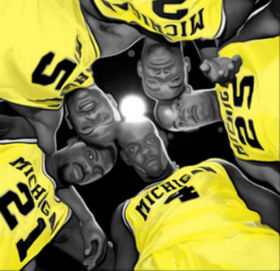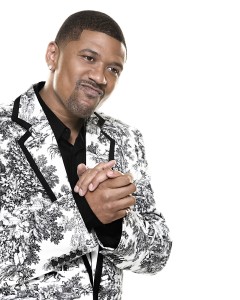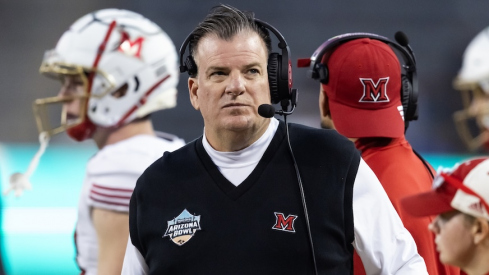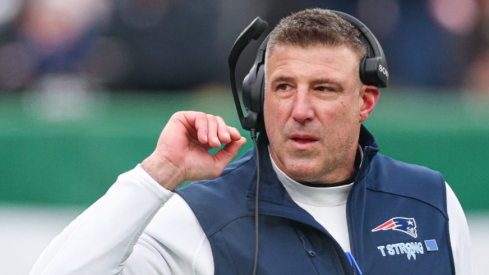 "One of the three or four most egregious violations of
"One of the three or four most egregious violations ofNCAA bylaws in the history of the association "
(Ed: Once again timing is a biotch. This column was penned ahead of our own crisis of confidence but with the documentary airing Sunday, we felt it worthwhile to run this anyway. In short: Yes, our glass house is gorgeous.)
Twenty years ago this fall, five heralded basketball prep stars arrived in Ann Arbor amidst unprecedented fanfare. Four of them – Chris Webber, Juwan Howard, Jalen Rose and Jimmy King – were McDonalds All-Americans who were all in the top ten among recruits nationally. The weakest link of the class – Ray Jackson – was merely your highly-sought garden variety top-100 recruit that could have been the headliner in most other recruiting classes. Twenty years later, the Fab Five is remembered more for its contributions to basketball culture than to any trophy cases.
Michigan’s infamous freshman class of 1991, by any assessment, left a mark on college basketball that was felt for years – both at Michigan and across all of college basketball. The merits of that impact at large and the legacy of the Fab Five could certainly be debated between Fab Five loyalists and the rest of humanity. The former’s potentially distorted and misguided sense of self-importance has now been captured in documentary form, set to debut this Sunday in ESPN’s “The Fab Five.” The film was executive-produced by none other than Rose, one-fifth of the film’s central cast.
Rose referred to the comprehensive documentary as “the Bible” when he spoke to the Detroit Free Press last week in promoting the film, of which he is a stakeholder. It’s a curious description for a film that should be about a tarnished legacy and unfulfilled potential, especially considering the fact that Webber, the best of the Five, declined to participate in the project. It would be like producing a retrospective documentary about the Beatles that John Lennon refused to be interviewed for, and if the Beatles never had a single gold record (more on that later).
Following the well-documented downfall of Michigan basketball that began with multiple Wolverine players cited as beneficiaries of Ed Martin’s illegal gambling and money laundering activities, Webber lost his place on the 1993 All-America team. He was then suspended by the NBA after the verdict and the Michigan High School Athletic Association even requested that his high school vacate its three titles won during his tenure. NCAA infractions chairman Tom Yeager called Michigan’s case “one of the three or four most egregious violations of NCAA bylaws in the history of the association.” So yes, this story is terrific documentary material.
Webber, who once famously griped about not having enough money to buy pizza despite the fact that his number four jersey was being sold in Main Street shops on campus for $50 was found to have received part of $616,000 paid by Martin to him and three other players; his share being adequate pizza money by any conservative estimate. Had Cecil Newton been more familiar with how star recruits landed at Michigan in the early and mid-nineties, it would have made him blush, if not renegotiate his terms with Auburn and Mississippi State.
Word association with the Fab Five is relatively simple and uncontroversial exercise: Baggy. Bald. Brash. Skilled. Unprecedented. Corrupt. Indicted. Vacated. Disassociated. Webber was the first to leave Michigan, having forfeited his remaining eligibility after his sophomore year to enter the NBA draft. Should he choose to re-establish his relationship with the school in 2012 (which is the end of the NCAA’s 10-year ban from Michigan associating with him) he will be the last one to come back.
For Michigan the Fab Five is an ongoing conflict of admiration for the level of play and the style they demonstrated over the two seasons in which they stayed intact, and the underlying resentment ensuing from the subsequent shame and debilitating damage levied against the school for their actions. No Michigan team since 1993 has come remotely close to the same level of basketball competence, largely because Michigan basketball has consistently been a lower-tier program since the Five exhausted its eligibility.
The Wolverines are currently aiming for their second NCAA bid in a dozen seasons. It would be difficult to forget the Fab Five regardless, let alone if they had competent and non-disgraced successors to help them fade away faster. As a Big Ten homer, I can name Michigan’s starting five from 1986 to 1989 without looking it up. Conversely, it would be difficult for me to quickly name five Michigan players from the past ten years. The Fab Five’s shadow still lingers over current Michigan teams, and they still represent Michigan basketball because no one has effectively replaced them yet.
The Fab Five led two very nice NCAA tournament runs, as freshmen and sophomores. Their performances in the 1992 and 1993 tournaments despite only winning five games in a row instead of the six required for a title are enough to justify the lore. Besides, the all-or-nothing nature of basketball’s postseason unfairly diminishes the accomplishments of the vast majority of teams. Getting to the title game twice and losing is not at all shameful (ask any of Jerry Lucas’ teammates about that). The real shame exists in just about everything that lies beneath those two tournament runs, not Michigan's failures in the championship games.
But just as any breathless Michigan hater will repeatedly remind you whenever the subject arises, the Fab Five failed to truly win anything, let alone the national title. Ohio State, Indiana and Purdue (twice) won the crowns during the years when Fab Five players were active. The 2011 season iis both the 20-year anniversary of the Fab Five arriving on campus and the 25-year anniversary of Michigan’s most recent conference title. It comfortably predates the births of every current Michigan player.
 Wants you to watch "the Bible"
Wants you to watch "the Bible"Just as there were zero titles, no individual member of the Fab Five was ever the Big Ten's Player of the Year either. Jimmy Jackson, Calbert Cheaney, Glenn Robinson and Shawn Respert were the winners of that era. No NBA titles or NBA MVPs were claimed after Michigan either. The only individual award of note won by any member of the Fab Five was by Jackson, who was the Continental Basketball Association’s Rookie of the Year in 1996 when he was playing for the Grand Rapids Hoops. Now you know the answer to a trivia question that will never be asked.
The Naismith Award in 1992 and 1993 also eluded the Fab Five. They went to Christian Laettner of Duke and Cheaney of Indiana, respectively. Cheaney, who in partciular feasted on Michigan, was a player in stark contrast to the Fab Five: His lone scholarship offers were from IU and his hometown school of Evansville. Laettner and Cheaney had several things in common: They both wore short shorts, were both four-year players and their respective schools ceremoniously took down the Fab Five on more than one occasion.
Beyond their futility in the trophy case there is the matter of those six magical weeks in 1992 and 1993 being significantly tarnished by corruption and scandal. ESPN’s excellent 30 for 30 documentary about SMU football was titled “Pony Excess.” The impetus was on the corruption and hubris that dominated the program which ultimately produced its downfall. Conversely, the tagline of the Rose-produced documentary is “How five college freshmen ignited a basketball revolution.” It’s got to be only revolution in the history of the world built on black socks, baggy shorts, trash-talk and second-place finishes. With the Fab Five, the real debate of its contribution is a matter of impact versus value. Terrific impact; negligible, if not negative value.
As far as historical standards go, the Fab Five wasn’t even the NCAA’s sexiest repeat-bridesmaid; for that you’d have to also consider Houston’s Phi Slamma Jamma featuring Hakeem Olajuwon, Clyde Drexler and Michael Young. Michigan won four Big Ten titles in the 20 years that preceded the Fab Five and have none since. If the Fab Five really fought a basketball revolution then the University of Michigan definitely lost.
Tertiary facts aside, you cannot argue with the impact the Fab Five had on basketball culture, a decidedly soft benefit for basketball nerds and purists. As an incoming college freshman in the fall of 1991 myself, I had been hearing about my fellow freshmen who were enrolling at Michigan for several months – and consider this was long before we had the Internet to inform us of just how good other schools’ players were going to be. The hype they were born into college with as well as the hype their legacy still carries today is at the core of why they’re still romanticized two decades later.
From the Buckeye perspective, there shouldn’t be any latent bitterness about Michigan defeating Ohio State in the 1992 Elite Eight game, a season in which the Buckeyes had already beaten the Fab Five-led Wolverines twice by double-digits. Michigan had conducted eerily similar heartbreak three years earlier to the Flyin’ Illini en route to its improbably 1989 NCAA title under then-interim coach Steve Fischer.
Both teams played very well; the officials were largely invisible and it was a terrific game outside of the outcome. Besides, during the 1990s Michigan ending Ohio State seasons in agonizing, unspeakable fashion was the norm, and the Buckeyes were on the precipice of their own, smaller-scale basketball shaming themselves.
When the shit hit the fan, it wasn’t just Michigan and the NCAA investigating the basketball program. The FBI was heavily involved, along with the Department of Justice and the IRS. More substantial than the impact that baggy shorts and black socks had on American culture was the crater left where Michigan basketball had previously been. Hiring Brian Ellerbe and Tommy Amaker to conduct program resuscitation only made matters worse. Michigan's basketball program was poisoned.
John Beilein, three coaches later, now has the Wolverines perched on the bubble of the NCAA tournament bid, which is not the high-watermark for current Michigan basketball, but it is close. A surprising season sweep of Michigan State is by far the best thing to happen to the Wolverines since the 1993 Final Four.
If you’re wholly uninterested in tuning into the film’s debut on Sunday after the brackets are announced, your college basketball fandom has to come into question. The measure by which you hate Michigan is independent of the impact the Fab Five had on basketball culture. Besides, Webber, Howard, Rose, King and Jackson are certainly fascinating documentary-material, as most spectacular letdowns generally have the potential to be.

